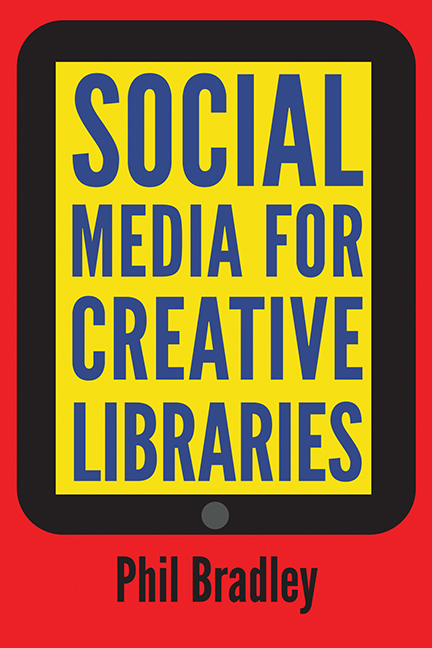Book contents
- Frontmatter
- Contents
- List of figures
- Preface
- 1 An introduction to social media
- 2 Authority checking
- 3 Guiding tools
- 4 Current awareness and selective dissemination of information resources
- 5 Presentation tools
- 6 Teaching and training
- 7 Communication
- 8 Marketing and promotion – the groundwork
- 9 Marketing and promotion – the practicalities
- 10 Creating a social media policy
- Appendix: Social media disasters
- Index
10 - Creating a social media policy
Published online by Cambridge University Press: 10 September 2022
- Frontmatter
- Contents
- List of figures
- Preface
- 1 An introduction to social media
- 2 Authority checking
- 3 Guiding tools
- 4 Current awareness and selective dissemination of information resources
- 5 Presentation tools
- 6 Teaching and training
- 7 Communication
- 8 Marketing and promotion – the groundwork
- 9 Marketing and promotion – the practicalities
- 10 Creating a social media policy
- Appendix: Social media disasters
- Index
Summary
Introduction
A question that I often ask delegates on courses is: ‘Does your organization have a social media policy?’ and the answer is usually in the negative. I have long ceased to be surprised by this since it's the norm rather than the exception. Indeed, in a recent FT-ICSA Boardroom Bellwether report (https://www.icsa.org.uk/assets/files/pdfs/Business%20Bellwether/icsa-ftbellwether- 5.pdf) 47% of respondents said that their board had never discussed a social media policy and 39% had only discussed it between one and three times. Only 7% said that their board had discussed social media more often. Furthermore, only 26% of respondents stated that a social media strategy was important, with 65% describing it as neutral or unimportant. I think that there are many reasons for this, some of which I have previously mentioned; they are unfamiliar with social media either in practice or concept, and they find the terminology of likes, followers, tweets and so on something they dislike or feel uncomfortable about. The end result is that employees, who are often far more familiar with social media, don't feel that they are being given support; they’re unsure on what they are allowed to do and what they shouldn't do, leading to a situation where they do nothing, or go off in a whole host of different directions with little help or guidance.
A good social media policy will protect the staff and the library; it will mean that they are able to work on social media with much more confidence, difficult situations can be handled swiftly and effectively, and the entire organization will benefit rather than suffer. In this chapter I’ll look at some of the things that you can take into account when putting a policy together, and as a humorous aside we can take a look at some organizations who didn't think that far ahead and what happened as a result.
Why an organization needs a social media policy
A statement on why an organization needs and wants to have a social media policy should be right at the heart and the start of any document. It will help set the structure and give employees a clear idea of what is expected of them by the organization, how they are to implement it, and for what purpose.
- Type
- Chapter
- Information
- Social Media for Creative Libraries , pp. 147 - 158Publisher: FacetPrint publication year: 2015



